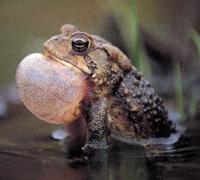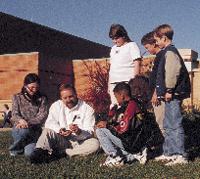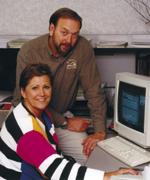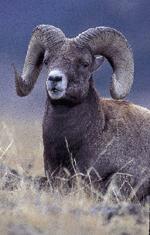Mike Roberts has realized a
dream in his Return to Nature
By Bill Sherrod, Managing Editor
There’s nothing quite like the buzz of an agitated timber rattlesnake to grab
your attention.
Mike Roberts sometimes uses a live rattlesnake in his Return to Nature educational
programs. It seldom fails to focus the attention of the young students for whom his
programs are designed.

Creatures great and small capture the fancy of Mike
Roberts, as evidenced in his spectacular wildlife photography.
|
For Roberts, the effect of the rattler’s buzzing is not terribly unlike the
wake-up call that jangled his consciousness nearly 10 years ago and two-thirds the way
across the United States. It was a wake-up call that set him on the way down a road that,
prior to 1991, he would never have imagined himself traveling.
A lifelong wildlife enthusiast and amateur photographer, Roberts was in Colorado to
attend a wildlife-photography seminar conducted by his mentor, world-renowned outdoor
photographer Leonard Lee Rue III, back in May 1991.
While in the city, he visited the Denver Museum of Natural History. Twice during his
visit, he heard teachers give their students inaccurate information about the wildlife
that was depicted in the museum’s displays.
"That night, I lay in a Denver hotel room wide awake, thinking about what I had
heard. I couldn’t shake this bad feeling I had about the misinformation given to
those children. During that sleepless night, I came to the decision that I would find the
means to visit classrooms to expose students and teachers to what I knew about wildlife
and conservation of natural resources."
A Bedford County native, Roberts at this time was in the midst of a drafting career at
Lynchburg’s Babcock and Wilcox. He had never worked as a teacher nor as a biologist.
His knowledge of nature came from the experience he had gained over the years being
outdoors.
"When I got back home, I called Lynchburg College and asked to speak to any one of
the school’s biology professors. I was connected to Dr. James Carrico. After a brief
introduction and conversation, we set up an appointment to meet.
"A few days later, I was sitting in his office explaining what had happened in
Denver and the idea I had. I asked him if he thought I was completely off my rocker to
consider creating such a program without a formal education at such a late time in life.
"He answered by describing a student he once had. Seems the student was not
majoring in biology, but had become quite interested in spiders. Enrolling in his class,
the woman became so fascinated with the eight-legged creatures that she even took
photography classes to study them more closely. In time, this student became an authority
on spiders and soon was conducting seminars all over the country. In fact, her work became
so popular that she had to hire a full-time secretary to schedule the sessions. When he
had finished the story, I asked Dr. Carrico how this related to my situation. He told me
that the woman was 62 years old when she took his class! I walked out of his office with a
feeling of genuine purpose, the first I could recall having in my entire life."
Putting Plans into Action

Mike Roberts demonstrates turkey calling technique to
students at Stuart’s Draft Elementary.
|
About a year before his watershed trip to Colorado and the Denver Museum of
Natural History, Roberts had visited Huddleston Elementary School in Bedford County at the
request of Roy Monk, a friend of his and the school’s principal. "He’d
asked me if I would come talk about nature, and I gladly agreed. It was fun, and
afterwards, he told me I needed to pursue this type of thing," Roberts says.
"I found this especially odd because before I’d always had a fear of speaking
in front of groups."
With the added impetus of the purpose imbued within him by Dr. Carrico’s words,
Roberts set out in 1991 to begin to bring the message he held dear to schoolchildren
across the Old Dominion. The message is simple: We are a part of the environment and as
such we have a stewardship responsibility to it.
The program was incorporated by the State Corporation Commission in 1992 and received
its IRS tax-exempt status in 1993.
"For about four-and-a-half or five years we did programs around the state, just to
get feedback from teachers and principals to see if this is the type of message and kind
of program that they wanted. We realized that if the teachers didn’t accept what we
were doing, we would not have an audience and the program would die." During this
span, Roberts was doing the programs in what spare time he could piece together, on a
volunteer basis.
Roberts needn’t have worried about Virginia’s teachers accepting Return to
Nature. The response to his program was overwhelming, so much so that, "We
couldn’t keep up with the requests for the program," he says. "That’s
when we started talking about going full-time with the program," he notes.
That happened in August 2000. He had been doing the program part-time on a purely
volunteer basis for eight years by that point. Roberts retired from his job with Babcock
and Wilcox and this school year began working full-time as Return to Nature’s
executive director. He is assisted by Teresa Craig, director of administration and the
only other Return to Nature employee.
"I’ve known Mike since he dreamed up this program more than 10 years
ago," notes Craig. She and Roberts met when Craig was setting up a surprise hunting
trip to Montana for her husband, Jerry.

Mike and his assistant Teresa Craig (below), the only
Return to Nature Inc. employees, provide the program to schools all across the
Commonwealth.
|
"Teresa keeps things going," notes Roberts. "She keeps everything
organized, helps set up my schedule, keeps up correspondence and does the
bookkeeping," he adds. Return to Nature is currently operating out of donated office
space on the 19th floor of the Wachovia Building on Main Street in Lynchburg. The Wachovia
donation is typical of many that have helped propel the program.
"The program has received great support from Virginia’s electric
cooperatives, as well as the Virginia Department of Game and Inland Fisheries, and the
Virginia State Chapter of the National Wild Turkey Federation," Roberts notes.
"The National Wild Turkey Federation is one of the premier wildlife conservation
organizations in the country," he adds. "The Virginia State Chapter of the NWTF
has been very supportive of Return to Nature. They understand the importance of education
to conservation efforts. They were one of the initial supporters."
The organization has an 11-member board of directors. Directors include Del. W.W.
"Ted" Bennett, M. John Bowman, Michael Christian, Robert W. "Bob"
Duncan, Edgar Garrard, Bob Halstead, Holt Hogan, David McCoy, Winfred Nash, Bill
Thomasson, and Dr. Carolyn Wells. Duncan is director of the Wildlife Division of the
Virginia Department of Game and Inland Fisheries, and Wells is chairman of the Science
Department at Longwood College.
A Balanced Program
John Bowman, executive vice president and general manager of Mecklenburg Electric
Cooperative, is an avid sportsman and active member of numerous wildlife organizations,
including Ducks Unlimited, Quail Unlimited, and the National Wild Turkey Federation.
"Return to Nature is an extremely valuable program, because it is balanced,"
notes Bowman. "It brings young people together for the time of the program and
presents a balanced view of wildlife conservation ---- the idea is that progress and
wildlife conservation are not contradictory terms."
Roberts is particularly well suited to delivering the message to schoolchildren across
Virginia, Bowman adds.
"Mike approaches what he is doing with so much enthusiasm that it’s just
about impossible to attend one of his programs and not get excited about conservation. I
belong to several wildlife conservation organizations, and I can tell you that none of
them seem to work as well with young people as Return to Nature. Mike did these programs
on a purely volunteer basis for years, and he’s just as enthusiastic today as he was
when he first started doing them."
Bob Duncan, director of the Wildlife Division of the Virginia Department of Game and
Inland Fisheries, adds that "Return to Nature is probably the best example of
conservation education that I have seen. Mike has a wonderful message about renewable
resources and wildlife management programs, and he has such genuine enthusiasm for what he
is doing ---- enthusiasm born out of his love for wildlife."
Since he began this crusade in 1991, Roberts has carried the message to more than
60,000 schoolchildren across Virginia. This school year alone, since September, he has
delivered the message to more than 7,000 schoolchildren.
"We couldn’t be more blessed than to have a fellow like Mike Roberts out
there. His message and the way he delivers it leaves children of all ages in awe.
We’re delighted to be able to work with him and to be associated with him,"
Duncan adds. "He’s an absolutely gifted person who is doing such an important
job in getting this message out ---- that wildlife, and trees, are renewable resources and
that all of these need the proper stewardship."
Ask him why he does what he does, and Roberts will point out the following passage from
A Sand County Almanac published in 1949 by Aldo Leopold:
 |
Like winds and sunsets, wild things were taken for granted until progress
began to do away with them. Now we face the question whether a still higher ‘standard
of living’ is worth its cost in the things natural, wild and free. For us of the
minority, the opportunity to see geese is more important than television, and the chance
to find a pasque-flower is a right as inalienable as free speech.
That’s the whole basis of what this program is all about," Roberts says with
a smile. "That’s what Return to Nature is all about."
Interested?
For more information about the Return to Nature program contact Mike Roberts,
executive director, or Teresa Craig, director of administration, at P.O. Box 620,
Lynchburg, VA 24505. The phone number is (804) 847-4671; the fax number is (540) 586-5068;
and the e-mail address is :
[email protected] |